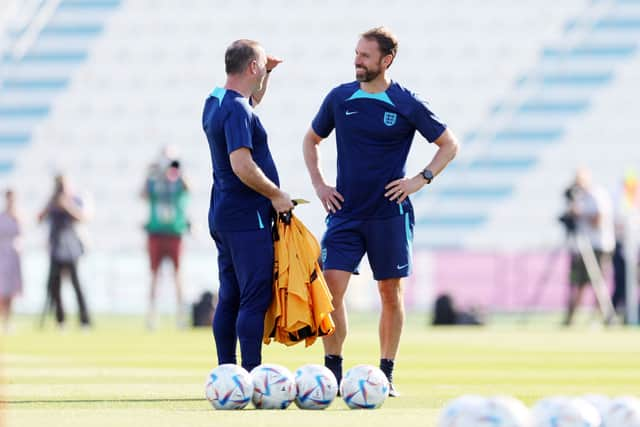Gareth Southgate’s England can learn a lot from Mike Bassett, but not his tactics
and live on Freeview channel 276
According to the oft-heralded lab rats and number-crunchers, England have not played a 4-4-2 formation since October 5th 2017 - a period of more than half a decade. Mike Bassett would be turning in his grave... assuming he’s passed away in the BCU (Bassett Cinematic Universe).
That match, in case you were wondering, was a late 1-0 win over Slovenia at Wembley, with Harry Kane scoring the decisive goal deep into stoppage time. From that day forth, and especially in more recent times, Gareth Southgate has tended to employ either a three or a five at the back, depending on whether or not he’s had his Ready Brek on any given morning.
Advertisement
Advertisement
And so it was heading into the Qatar World Cup. Maligned by many for a perceived excess of conservatism, reticently hailed by a few for his necessitated pragmatism, Southgate was widely expected to opt for his preferred combo of wing-backs and two holding midfielders. Instead, like your dad ordering a fruity cocktail instead of his usual pint of Guinness, Gareth shocked us all by playing three, that’s right, three midfielders, and three out-and-out attackers. The team news came out on Monday lunchtime and I had a nosebleed.


Questions over whether or not Southgate’s newfound daring worked feel somewhat arbitrary. England won 6-2, so yes it did, but equally, Iran were so lacklustre that the Three Lions probably could have fielded a Chrismas Pudding formation with Declan Rice in the sixpence role and still come out on top. What will be interesting, however, is to see how far the manager’s nerve takes him when faced with more rigorous tests.
At the risk of tempting fate, England will fancy their chances of progressing from Group B with relative ease having already secured three points, and with neither the USA or Wales setting the world alight in their own seesawing tournament opener. But would Southgate be willing to go toe-to-toe with, say, France or Brazil or even the Netherlands in the knockout stages? Only he will know, but you’d be forgiven for believing that the answer will be ‘nope’.
One thing is almost certain, though; England will not be reverting back to a 4-4-2. In fact, of the 32 nations competing at this year’s World Cup, just Qatar, Costa Rica, and arguably Argentina chose to utilise the traditional formation in their opening matches. All three lost. Tactics, like everything, go through trends. There was a time when the 4-4-2 was king, when it was so ubiquitous that it felt unconquerable. But, as they did with BlackBerry phones and the mullet, people eventually realised there was a better way.
Advertisement
Advertisement
The reasons for the collapse of the ‘two banks of four’ supremacy are probably multi-faceted and relatively complex, but to me, a certified idiot, it seems that the main issue is the ease with which teams can be overrun in midfield. For a manager of Southgate’s cautious proclivities in particular, the prospect of such a swamping must feel like a waking nightmare. Several of the early contests we’ve seen at this year’s World Cup have been tetchy, snug affairs with little quarter given. As we progress into the latter stages and the heavyweights start to collide with greater frequency, expect to see that trend continue.
In truth, England could probably learn quite a lot from Mike Bassett this winter; his cultivation of a siege mentality in response to widespread pessimism, his deft handling of media relations, his bouncebackability. But one thing they won’t be doing is playing 4-4-f******-2.
